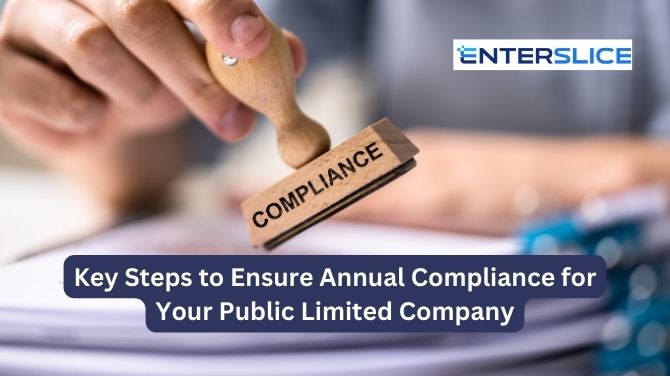Running a public limited company (PLC) comes with a unique set of challenges and responsibilities. One of the most critical aspects of managing a PLC is ensuring annual compliance with legal and regulatory requirements. Failure to comply with these regulations can result in severe penalties, legal issues, or even the dissolution of the company. Therefore, maintaining public company compliance is crucial for the long-term success and sustainability of your business.
In this blog, we will walk you through the key steps to ensure your public limited company remains compliant throughout the year. These steps not only protect your company legally but also build trust with investors, customers, and stakeholders.
1. Understand the Regulatory Framework
The first step in ensuring compliance for public limited companies is understanding the regulatory environment in which your business operates. Public companies are subject to a variety of laws, rules, and regulations, which can vary depending on the country and jurisdiction in which they operate.
Some of the key regulations governing public limited companies include:
- Company Law (such as the Companies Act in India or the Companies Act 2006 in the UK)
- Securities and Exchange Board of India (SEBI) Regulations
- Financial Reporting and Disclosure Regulations
- Corporate Governance Guidelines
Understanding these laws and how they apply to your business is crucial to ensure compliance. This knowledge can help you avoid penalties and maintain smooth business operations.
2. Annual Filing of Financial Statements
One of the primary components of Annual Compliance for Public Limited Companies is the filing of financial statements. These statements should be prepared in accordance with the applicable accounting standards, such as International Financial Reporting Standards (IFRS) or Generally Accepted Accounting Principles (GAAP), depending on your jurisdiction.
The financial statements typically include:
- Balance Sheet
- Income Statement
- Cash Flow Statement
- Statement of Changes in Equity
These documents provide transparency and ensure that your company’s financial performance and health are clearly communicated to shareholders, regulators, and other stakeholders. Timely submission of these statements to the relevant regulatory authorities is a non-negotiable requirement for maintaining compliance.
3. Hold an Annual General Meeting (AGM)
Public limited companies are legally required to hold an Annual General Meeting (AGM). This meeting is an important event where shareholders meet to discuss the company’s performance, financial results, corporate strategies, and any other issues that require shareholder approval.
Typically, the AGM covers the following topics:
- Presentation of financial results
- Election or re-election of board members
- Approval of dividends
- Appointment or reappointment of auditors
Holding the AGM on time and conducting it as per the legal requirements ensures your company stays in line with corporate governance practices and satisfies public company compliance.
4. Ensure Timely Submission of Tax Returns
Filing your company’s annual tax returns is another crucial step in ensuring annual compliance for your public limited company. Tax authorities, such as the Income Tax Department (India) or the IRS (United States), have strict deadlines for tax filings.
You must ensure that all required forms, such as the corporate income tax return and other relevant documents, are submitted on time. Missing tax filing deadlines can result in fines, penalties, or even legal action. Moreover, accurate tax filings reflect well on your company and can help with any future audits.
5. Review Corporate Governance Practices
Corporate governance is a cornerstone of public company compliance. It encompasses the systems and processes by which companies are directed and controlled. Effective corporate governance ensures that the company operates ethically, with transparency, and in the best interests of shareholders and stakeholders.
Public limited companies must comply with governance regulations that may include:
- Maintaining a transparent and independent board of directors
- Ensuring the separation of roles of chairman and CEO
- Implementing proper internal control mechanisms
- Establishing robust procedures for reporting any conflicts of interest
Regularly reviewing and improving your company’s corporate governance practices will help your PLC stay in good standing and avoid governance-related issues.
6. Prepare and Maintain Legal Documents
A critical component of compliance for public limited companies is maintaining up-to-date legal documents. These documents serve as proof of the company’s legal standing and business operations. Key documents include:
- Articles of Association: This outlines the rules that govern how the company operates.
- Shareholder Agreements: These define the rights and obligations of shareholders.
- Board Resolutions: Official records of decisions made by the board of directors.
- Licenses and Permits: Ensure all necessary business licenses and permits are renewed annually.
Having an organized, accessible legal document management system will help your company comply with legal requirements and avoid unnecessary delays or issues.
7. Conduct Regular Audits
To stay compliant, a public limited company must undergo regular internal and external audits. An annual audit by external auditors ensures that the financial statements accurately reflect the company’s performance and that the company adheres to accounting standards and regulations.
Internal audits help the company identify areas of improvement, mitigate risks, and ensure that internal controls are functioning correctly. Regular audits also demonstrate your commitment to transparency and ethical business practices, reinforcing the trust of investors and regulators alike.
8. Comply with Shareholder Reporting Requirements
Public limited companies have a responsibility to keep their shareholders informed. This includes timely communication about financial results, business strategies, and any material changes that could affect the value of their investments.
Compliance with shareholder reporting requirements involves issuing quarterly and annual reports that provide shareholders with insight into the company’s financial position, future plans, and performance. Ensuring transparency in these reports is essential for building and maintaining investor confidence.
9. Stay Updated with Changes in Legislation
Laws and regulations governing public limited companies are constantly evolving. It is crucial to stay updated with any changes in corporate laws, tax regulations, securities laws, and other relevant areas that could impact your compliance obligations.
Regularly consulting with legal and accounting experts ensures that your company remains ahead of any regulatory changes. Being proactive in adapting to new legislation is a key aspect of Annual Compliance for Public Limited Companies.
10. Ensure Compliance with Environmental, Social, and Governance (ESG) Standards
In today’s business landscape, more emphasis is being placed on sustainability and corporate responsibility. Companies are expected to comply with Environmental, Social, and Governance (ESG) standards that ensure they operate in a socially responsible and environmentally sustainable manner.
For public limited companies, complying with ESG guidelines not only meets regulatory requirements but also boosts your reputation with investors, customers, and other stakeholders.
FAQs
1. What is the difference between compliance for public limited companies and compliance for LLP companies?
Compliance for public limited companies typically involves more stringent regulatory requirements due to their larger scope and the fact that they are publicly traded. On the other hand, compliance for LLP companies (Limited Liability Partnerships) have fewer compliance obligations, as they do not issue shares to the public and are generally smaller in scale.
2. How often does a public limited company need to conduct audits?
Public limited companies are required to conduct an annual audit by an external auditor. This audit is essential for ensuring that financial statements are accurate and compliant with relevant accounting standards.
3. What are the penalties for non-compliance with public company regulations?
Penalties for non-compliance can include financial fines, suspension of business operations, or even legal action. For serious violations, the company could face deregistration or the dissolution of the business.









